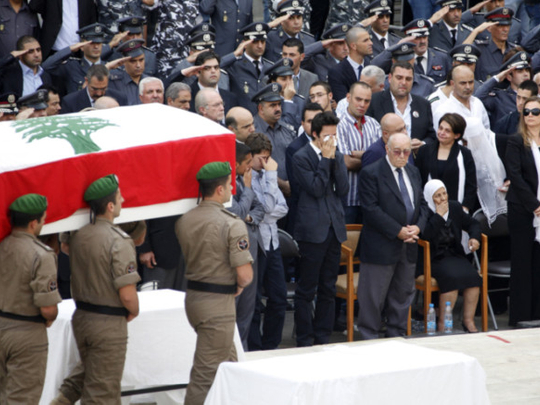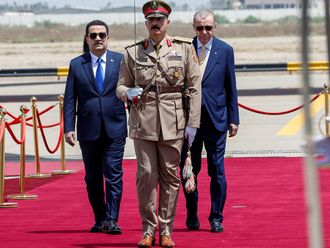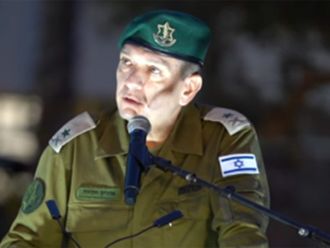
Beirut: Thousands of people gathered in central Beirut on Sunday for the funeral of an assassinated senior intelligence officer, accusing Syria of involvement in the killing and calling for Lebanese Prime Minister Najeeb Mikati to quit.
Heavily armed troops and police stood guard as people flocked to Martyrs’ Square in central Beirut.
Many waved the sky-blue flag of the Sunni-based opposition Future Party. Others carried Lebanon’s cedar tree national flag but Syrian rebel flags were also seen.
One banner read “Go, go Najib” echoing the slogans of the Arab Spring.
Brigadier General Wissam Al Hassan was killed by a powerful car bomb in Beirut’s Ashrafiyeh district on Friday. A Sunni Muslim close to the Hariri political clan, he had helped uncover a bomb plot that led to the arrest and indictment in August of a pro-Damascus former Lebanese minister.
He also led an investigation that implicated Syria and its Lebanese ally Hezbollah in the assassination of former prime minister Rafik Hariri in 2005.
Lebanese politicians have accused Syria’s leadership of having a role in Al Hassan’s killing, which deepened fears the civil war there is spreading over its borders.
People in the crowd at Martyrs’ Square echoed that view.
“We blame Bashar Al Assad, the president of Syria,” said Assmaa Diab, 14, from the northern city of Tripoli, Al Hassan’s hometown. She was in the square with her sister and father.
“He is responsible for everything — in the past, now, and if we don’t stand up to him, the future,” she said.
The prime minister was also a focus of their anger.
Diab and other protesters said they wanted him to step down, saying he was too close to Shiite Hezbollah, who are part of his government, and to Al Assad.
“We are here to tell Mikati we don’t need him any more and to tell Hezbollah we don’t want any more of their games,” said Hamza Akhrass, a 22-year-old student who had come from south Lebanon for the funeral. “Mikati takes too much pressure for Syria.”
One banner read “People want the overthrow of Najib”.
Mikati said on Saturday he had offered to resign to make way for a government of national unity but he had accepted a request by President Michel Sulaiman to stay in office to allow time for talks on a way out of the political crisis.
SECTARIAN TENSIONS
The 19-month-old uprising in Syria against Al ssad has exacerbated deep-seated sectarian tensions in Lebanon, which is still scarred from its 1975-90 civil war.
Sunni-led rebels in Syria are fighting to overthrow Al Assad, who is from the Alawite minority, which has its roots in Shiite Islam. Lebanon’s religious communities are divided between those that support Al Assad and those that back the rebels.
Mikati sought in vain to insulate the country from turmoil in its larger neighbour, which has long played a role in Lebanese politics.
Sunday’s funeral march set off from Al Hassan’s Internal Security Force headquarters in Ashrafiyeh and will pass the site of Friday’s bombing before reaching Martyrs’ Square where he will be buried alongside slain prime minister Hariri.
Mikati himself said he suspected Hassan’s assassination was linked to his role in uncovering Syrian involvement in the August bomb plot.
Samir Geagea, a Christian political leader and critic of Al Assad, demanded that Lebanon suspend all security and military agreements with Damascus and expel the Syrian ambassador.
In Paris, French Foreign Minister Laurent Fabius also pointed to a Damascus connection. “We don’t yet know exactly who is behind this but everything indicates that this is an extension of the Syrian tragedy,” he told French television.
“I think this is a part of what is happening in Syria and shows again how the departure of Bashar al-Assad is urgent.”
Hassan’s killing has already provoked unrest in Lebanon.
In the streets of Beirut and other cities on Saturday, gunmen and demonstrators blocked roads with burning tyres.
In the northern city of Tripoli, four people were wounded on Saturday by sniper fire on Jebel Mohsen, a neighbourhood which is home to members of the Alawite faith. A pro-Hezbollah religious figure was killed in clashes in Tripoli on Friday, residents said.
Soldiers opened fire on a group who took over a road in the Bekaa Valley, wounding two people.
“The situation is fragile. I don’t know if this is the first in a series of attacks — history would suggest it is,” a Western diplomat said.
“Of all the people to go for, Al Hassan was the most dangerous target in terms of hitting Lebanon’s stability.”











